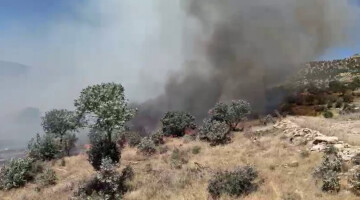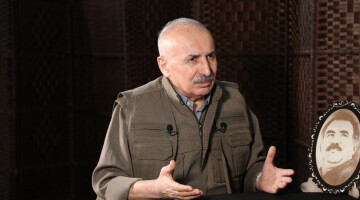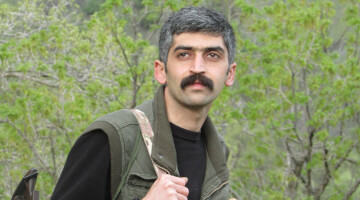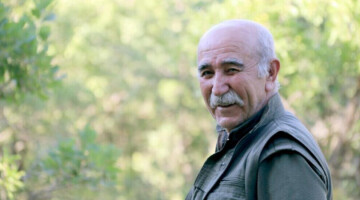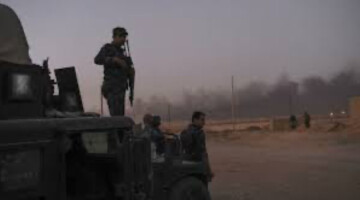When you look north from the village of Xerabê Bava (Koruköy), 40 km from Mardin’s Nusaybin district, you see the Omeryan mountains, and the Xerab mountains in the south. Xerabê Bava comes from the ruins left from the Med, Persian and Roma civilisations that were there in the past, the “Xerabê” part of its name meaning “ruined, demolished”. The people of the village and the region widely use just “Xerabê” to refer to it. The village of Xerabê Bava is reported to have been a city with a big population of 12 thousand households during the Roman period.
Xerabê Bava has been home to a host of civilisations, and is currently in the records as a village of 170 households and a population of 1700. But the migrations from the village cause fluctuations in the population.
Xerabê, or Xerabê Bava, has seen the rise and fall of empires, and has experienced its own downfall countless times by the attacks of the Turkish state, but it has stood back up every time, every time it was reborn.
HISTORY OF RESISTANCE TO TYRANNY IN XERABÊ
Xerabê met the Turkish state’s attacks before the 1990’s. Under the September 12 Junta conditions of the ‘80s, there have been many raids in the village, and the village chief and villagers have been taken into custody and put through torture countless times.
With the emergence of the Apoist movement, Xerabê Bava, having protected its values of patriotism in the face of the state’s denial, annihilation and oppression policies, faced a new layer of state oppression afterwards.
TURKISH ARMY PREVENT WATER ACCESS TO XERABÊ
Xerabê residents don’t only experience the physical torture from the state. The state also tortures Xerabê by “preventing water access”. Xerabê villagers who dug up wells and set up a transformer to bring water to the village in 1991 were stopped by the Turkish army, citing “security” as an excuse. The Turkish army confiscated the villagers’ transformer and prevented water access for the village.
TWO XERABÊ VILLAGERS ABDUCTED
The first extensive state attack on the village started with the mass detention in 1992. The villagers were kept in custody for days and then released later.
In the summer of 1994, the first atrocity was put into practice. The Turkish army raided the village under command of Colonel Erol Peynirci, then a captain in the Mardin region, last seen as camp commander in Istanbul Büyükçekmece Gendarmerie Command.
During the morning prayers, Erol Peynirci and his gang raided the village and gathered the villagers in the mosque courtyard. Meanwhile, the Turkish army entered every house and looted them, then set many houses and stables on fire. Villagers Hamit and Bayram Bal were separated from the rest of the villagers by Erol Peynirci’s orders, then the soldiers pushed them into the armored vehicle and drove off.
HAMİT AND BAYRAM DISAPPEARED IN THE COURT
There was no information on Hamit and Bayram Bal for 28 days after their abduction from the village. Later, they were taken to the Mardin courthouse, where they were released by the prosecutor. Hamit and Bayram were last seen alive in the court’s corridors. They were abducted from the courthouse by the Turkish army’s death gang JİTEM, and their tortured and tattered bodies were found near the Stilile (Akarsu) village in Nusaybin on December 20, 1994.
EXODUS FROM XERABÊ
After this, the villagers start moving out. The villagers of Xerabê move to Kızıltepe and Nusaybin districts, then return to the village in later years. The oppression of the Turkish army on the village of Xerabê didn’t end there. The Turkish army officials sent word for the village revitalized with those who have returned and threatened the villagers: “If terrorists come to the village, we will burn it down.” Before long, the army’s threats were actualized and Xerabê was bombed with artilleries.
XERABÊ UNDER ARTILLERY FIRE
On May 21, 1995, the Turkish army surrounded Xerabê and started to randomly fire artilleries into the village. The Turkish army dug up utility poles, burned down homes, killed livestock and lay ruin to the village. Only the stone houses survived. Xerabê villagers started leaving the village in greater numbers. The villagers only returned to the village with the influence of the solution process that developed by the Kurdish People’s Leader Öcalan’s efforts, in the early 2000s.
THE VILLAGE WHERE THE MURDERED JOURNALIST DENİZ WAS A TEACHER
Özgür Gündem columnist Hüseyin Deniz, murdered in Ceylanpınar, Urfa by Hezbollah-counter guerrilla units in 1992, taught in Xerabê between 1978-1979. Deniz had a good relationship with the villagers, and played an important role in their growing consciousness. The Xerabê villagers still remember Hüseyin Deniz today and fully embrace his legacy of struggle.
XERABÊ BURNED DOWN ONCE MORE
Xerabê lived through the September 12 Junta and the atrocities of the ‘90s, and was surrounded by forces loyal to the AKP and the Palace rule once more on February 11 of the year 2017. With the blockade, new destruction, torture, atrocities and executions are added to the memory of the Xerabê village, which already had one of the most poignant memories of the Turkish state’s oppression in Kurdistan. And this time, it’s more brutal, reckless and knows no bounds or values. The village Xerabê faced a brutality unseen in previous attacks. The village has been under siege for the last 10 days. In this time, 3 people were executed, animals have perished, people have faced starvation. Hundreds of Xerabê residents, young and old alike, are experiencing a great atrocity. The villagers can only watch their homes and their stables burned down, stating that this oppression is unprecedented and indescribable.
The curfew, attacks and torture continues in Xerabê village, and as of today, no clear information can be reached still.
In short, neither oppression nor resistance are new to Xerabê. Xerabê is one of the burning memories of the atrocities imposed upon the Kurdish people, it will not forget this addition to the atrocities, and will resist until the end.
Source: Yitik Köyler (Lost Villages) - Zülküf Kışanak









